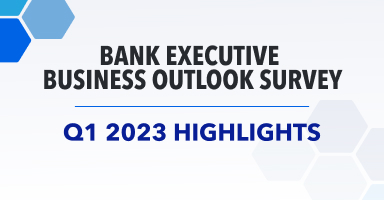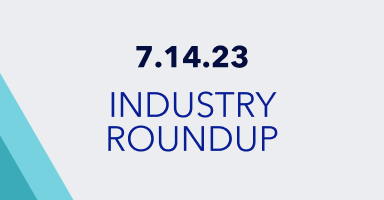First Republic's Woes, IntraFi's Q1 Executive Survey, and Stablecoins.

April 27, 2023
First Republic Bank is the Latest to Face Collapse
First Republic continues to face significant challenges after it announced it lost around $100 billion in deposits earlier this week — a 41% drop. An emergency infusion of $30 billion from some of the country’s biggest banks in March temporarily stopped the bleeding, but it also put public and private pressure on the bank to produce a long-term solution. Gloomy economic prospects, the bank’s underwater loan portfolio, and rules enacted after the financial crisis that limit regulators’ ability to assist struggling banks all present roadblocks to further intervention.
Despite Turmoil, IntraFi Study Finds Business as Usual for Most Banks
In the weeks that followed the dual collapse of SVB and Signature Banks, many in the media predicted major cash outflows from both community and regional banks.
However, in IntraFi’s Q1 Bank Executive Survey, 77% of bank executive respondents told us that they remained stable at their institutions despite the failures of SVB and Signature. Moreover, banks’ level of uninsured deposits remains low, particularly compared to those failed institutions. More than half of banks with less than $1 billion of assets had an uninsured deposit level of 20% or below, far, far below the 90%+ level at SVB.
New Paper Suggests Stablecoin Regulation Could Draw Deposits from Banks
Amid all the debate over stablecoin regulation, many policymakers may be overlooking what would happen to banks if stablecoins gain more legitimacy with retailers and consumers.
A new paper from the SEC’s former chief economist believes banks could lose 20% of deposits to stablecoins, in much the same way that banks lost ground to money market mutual funds in the late 1970s and 1980s. Moreover, the paper warns that the growth of stablecoins would come at the cost of credit availability and could particularly hurt small business lending. The only way widespread bank disintermediation would be stopped is if stablecoins use bank deposits as a form of reserves. (Full disclosure: The paper was underwritten by IntraFi, but we had no role in its analysis or conclusions.)
CFPB Has Still Not Notified Consumers About February Breach
Last February, CFPB examiners shared the personal information of more than 250,000 consumers (from forty-five institutions) via a personal email account. It took nearly three weeks for the agency to report the breach and The Wall Street Journal to report the incident.
Now, nearly two months later, the CFPB has yet to inform the consumers whose information was compromised. As a result, the CFPB is facing backlash. “It is hard to imagine the CFPB would be okay if some private company did that,” remarked one law professor and policy expert.
Demands for Answers, Accountability Follow Fed's SVB Report
This week the Fed and FDIC will release post-mortem analyses on the failures of SVB and Signature, along with new policy recommendations. For the reviews to be taken seriously, industry insiders say the Fed must be candid about its own mistakes. Karen Shaw Petrou, managing partner of Federal Financial Analytics, for one, is hoping the central bank has had a “structural epiphany” about its supervisory approach. Meanwhile, in the eyes of regulators, one inescapable element of the two incidents involve the speed with which the two banks collapsed.
Can the Fed Bypass Congress to Issue Digital Dollar? Maybe.
Federal Reserve Chair Jerome Powell has long maintained the central bank needs congressional approval to roll out a digital dollar, but some experts disagree. They believe the Treasury Department’s power to print and mint currency—coupled with the Fed’s powers to distribute it—are all the authority the central bank needs.
FSOC Isn’t Reining in Nonbanks Anytime Soon
Many in the banking industry welcomed news of the Financial Stability Oversight Council's proposals to expedite and expand their authority to designate nonbanks as systemically risky, but now any form of regulation may be a long time coming.
Initially, when the council issued the proposals, banking trade groups offered their support of both FSOC and the push to rein in nonbank firms and activities that they say skirt the kinds of regulation the public has come to expect from banks. However, given anticipated pushback from nonbanks and GOP lawmakers, results will take some time to materialize.


